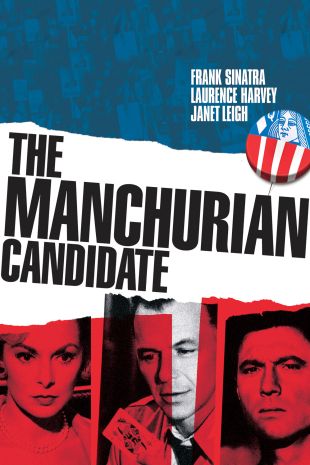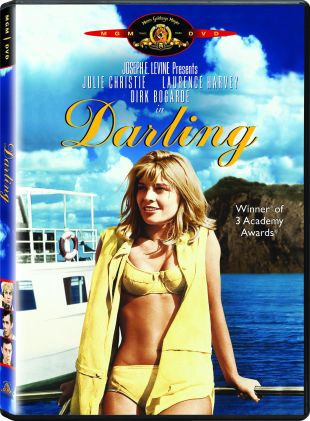Laurence Harvey was one of Hollywood's stranger success stories; never a major star, or even the subject of a cult following, his films were rarely hits, and those that were often seemed to achieve their popularity in spite of him. A cold, remote actor, he proved highly unsuited to the majority of the roles which came his way, and his performances were typically the subject of unanimous critical dismissal; even his co-stars frequently derided his abilities. At the same time, however, Harvey enjoyed a career much longer and more prolific than many of his more lauded contemporaries, and was one of the most prominent onscreen presences of the 1960s. Also to his credit, his resumé includes at least one certified classic, 1962's The Manchurian Candidate.
Harvey was born Lauruska Mischa Skikne on October 1, 1928, in Joniskis, Lithuania. Raised in South Africa, he served in Egypt and Italy during World War II, and after performing in the army show The Bandoliers he returned to Johannesburg to begin his theatrical career. He later relocated to Britain, where he tenured with the Manchester Library Theater and also worked as a male prostitute. In 1948, Harvey made his feature debut in the horror thriller House of Darkness, and its success earned him a two-year contract with Associated British Studios, resulting in lead roles in 1949's Man on the Run and the following year's Cairo Road. Smaller turns in Landfall and The Black Rose followed before he appeared in a disastrous West End revival of Hassan.
Harvey continued to languish in B-movies like 1951's There Is Another Sun before appearing in 1953's Women of Twilight. The picture was not a success, but the studio Romulus was so impressed by his performance that they made his career a top priority and cast him in the comedy Innocents in Paris. Harvey then appeared for the 1952 season with the Memorial Theatre at Stratford, earning almost unanimously poor notices. He responded by giving interviews which claimed that regardless of the critics, he was in fact a great actor, a game of cat-and-mouse with the press that went on for years. Despite his disappointing Shakespearean performances, Harvey was cast in a 1954 film treatment of Romeo and Juliet, delivering a virtually expressionless portrayal of the title hero. He then starred in the Warner Bros. production of King Richard and the Crusaders.
Upon returning to Britain, Harvey again worked under the auspices of Romulus, where in 1955 he starred in The Good Die Young. Margaret Leighton, one of his co-stars in the picture, later became his wife. After starring in I Am a Camera, he appeared opposite popular television comedian Jimmy Edwards in 1957's Three Men in a Boat, which became Harvey's first real hit. However, a series of disappointments -- After the Ball, The Truth About Women, and The Silent Enemy -- were to follow before he could again taste success in 1959's Room at the Top. Hollywood again took interest in Harvey, and in 1960 he co-starred with John Wayne in The Alamo, followed by an appearance in the Elizabeth Taylor hit Butterfield 8. A role in the 1961 British production The Long and the Short and the Tall was next, trailed by a pair of Hollywood flops, Two Lovers and Summer and Smoke.
Harvey remained a frequent target of reviewers' derision in all of these films, and even co-star Jane Fonda criticized his performance in 1962's Walk on the Wild Side. Finally, in John Frankenheimer's masterful The Manchurian Candidate, he found a role perfectly suited to his talents, portraying a brainwashed assassin shorn of emotion; the performance was the best of his career, but in a cruel twist of irony the film was pulled from distribution by producer/star Frank Sinatra when its plot too closely foreshadowed the tragic death of President John F. Kennedy. With 1963's The Ceremony, Harvey turned screenwriter and director as well as star. The result was a critical lambasting even more severe than usual, with response to both 1964's Of Human Bondage and The Outrage not much better.
A small role in John Schlesinger's superb Darling followed in 1965, but both 1966's The Spy With the Cold Nose and 1967's A Dandy in Aspic (which Harvey finished directing upon the death of original helmer Anthony Mann) sank without a trace. He then filmed 1969's Rebus in Italy with Ann-Margret, remaining there to produce and star in L'Assoluto Naturale. Appearances in 1970's The Magic Christian and the next year's Paul Newman vehicle W.U.S.A. followed, but Harvey proved unable to revive his stalling career. After working with Elizabeth Taylor in 1972's Night Watch, he directed and starred in one final film, 1974's Welcome to Arrow Beach, but did not live to see its premiere; he died of cancer on November 25, 1973.


